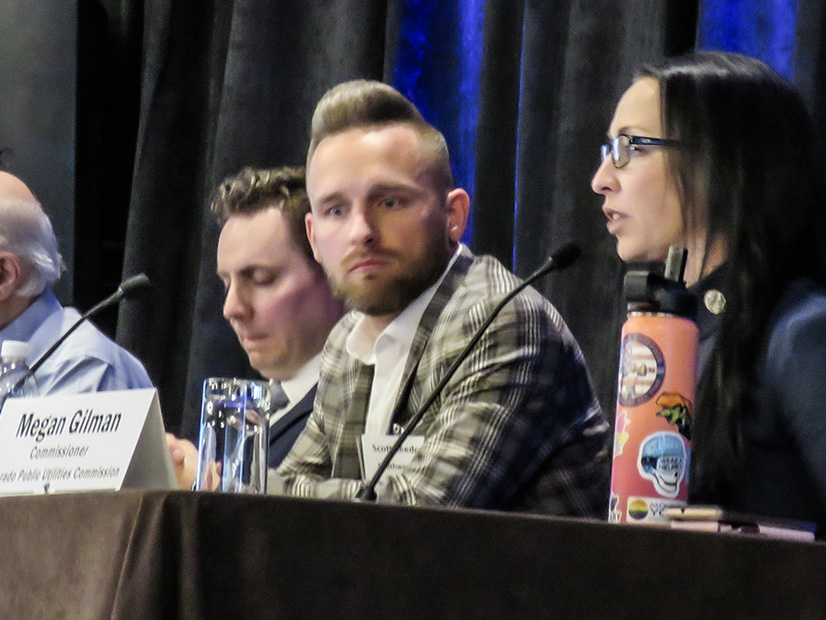Nevada natural gas utilities would be required to file a plan every three years, similar to the integrated resource plans filed by electric utilities, under a bill intended to make natural gas planning more transparent.
Senate Bill 281, by state Sen. Rochelle Nguyen (D), would require natural gas utilities to detail the amount of greenhouse gas reductions they would achieve and how they would promote energy efficiency and conservation.
The plan would assess the reliability of gas pipelines and spell out any significant operational or capital requirements for the next three years.
The Public Utilities Commission of Nevada (PUCN) would hold a public hearing on the plan and vote on whether to accept it. The first plan would be due on Oct. 1, 2025.
Under current law, a natural gas utility must file an informational report with PUCN each year, discussing natural gas demand, costs related to providing gas service and planned gas acquisitions. The reports don’t go through a hearing process.
“Senate Bill 281 increases transparency around natural gas infrastructure investments and provides an appropriate venue for all stakeholders to participate in and provide feedback to utility regulators on the need for future natural gas investments,” Nguyen said during a hearing on the bill this month before the Senate Growth and Infrastructure Committee.
In 2021, the PUCN opened an investigatory docket on the future of natural gas in Nevada. Stakeholders made it clear during that process that they’d like natural gas utilities to face planning requirements similar to those for electric utilities, Nguyen said.
The committee passed SB281 on April 12. The bill is exempt from an April 25 deadline for bills to pass out of their house of origin.
Supporters include Southwest Gas, the largest distributor of natural gas in Nevada, serving about 792,000 customers.
“We think this is a good bill. We think it’s a fair process. We’ve done a lot of work on it,” Scott Leedom, director of public affairs for Southwest Gas, said during the committee hearing.
Union representatives said the bill would promote transparency and create jobs.
Representatives of Chispa Nevada, a program of the League of Conservation Voters, said the bill would help combat soaring gas rates.
“SB281 is an important step to hold Southwest Gas accountable for current and future rate increases as well as the impact of their investments on the environment,” Chispa National Director Estefany Carrasco-Gonzalez said in a letter to the committee.
Previous Bill Failed
Leedom of Southwest Gas also discussed SB281 this month during a joint meeting of the Committee on Regional Electric Power Cooperation and the Western Interconnection Regional Advisory Body in Incline Village, Nevada. Leedom was a panelist during a session on natural gas planning.
SB281 follows another natural gas planning bill in Nevada, Assembly Bill 380 by Assemblywoman Lesley Cohen (D), which died in its first committee during the 2021 legislative session. Southwest Gas lobbied against the bill, saying it “effectively bans natural gas.” (See Bill Would Tighten Oversight for Nevada Gas Providers.)
Leedom said AB380 went beyond implementing a planning process by including measures to promote a transition away from commercial and residential use of natural gas. It also would have blocked the utility’s expansion into new areas for economic development purposes.
“We are open to a planning process — just not one that plans to our ultimate demise,” Leedom said.
After AB380 failed, Southwest Gas began working with Sen. Chris Brooks (D) on a bill creating a natural gas planning process, similar to the integrated resource plans required for electric utilities.
But Brooks, whom Leedom described as a central figure in Nevada energy policy, resigned from the Senate last year to take a job in private industry. The Clark County Commission appointed Nguyen to fill the vacant seat. Nguyen agreed to keep working on the bill.
Gas Infrastructure Bill
In this year’s legislative session, another natural gas bill has died. SB116 by Sen. Skip Daly (D) would have allowed natural gas utilities to file a gas infrastructure modernization plan for approval with the PUCN. The plan would cover infrastructure projects proposed for the next five years.
The utility could then recover its infrastructure costs through a separate monthly rate charged to customers.
Daly said during a hearing before the Senate Growth and Infrastructure Committee that the bill was intended to address the potential degradation of certain types of pipe. The U.S. Department of Transportation issued an advisory about the degradation, which it said has been seen in certain pipelines installed between 1978 and 1999 in the southwestern U.S. and potentially could be more widespread.
Opponents of the bill included the Nevada Conservation League, which said utilities already have an effective process for replacing old or leaky pipes. The League called the bill “a step in the wrong direction for ratepayers and climate goals.”
“SB116 would lock in decades of continued reliance on fossil fuels, even as new, more efficient technologies become available, while guaranteeing Southwest Gas continues to collect a check,” the League said in a news release.
After holding a hearing on SB116, the Senate Growth and Infrastructure Committee took no action on it. The bill missed the April 14 deadline for committee approval in the house of origin and is now dead.




